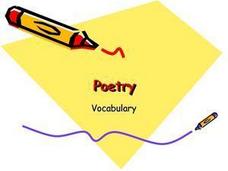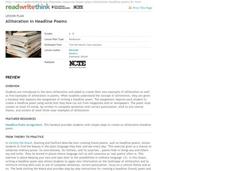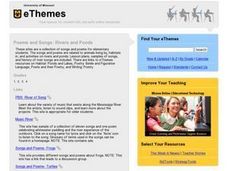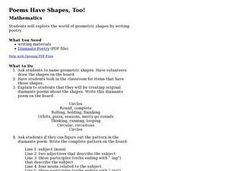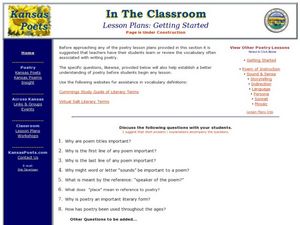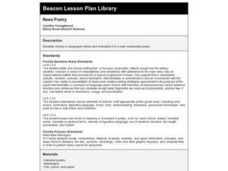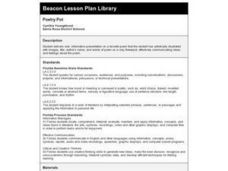Curated OER
Concrete Poems
Concrete poems, or shape poems as they are sometimes called, are the focus of the eighth instructional activity in this poetry unit. Young scholars examine several examples of concrete poems and consider how the shape contributes to the...
Teachnology
Shape (Or Concrete) Poems
Poetry comes in all shapes and sizes. Young writers pick a shape, select words and phrases that describe how the shape makes them feel, and create a shape poem. A raindrop example and step-by-step instructions give your budding poets a...
Poetry4kids
How to Write a Concrete or “Shape” Poem
Writers compose an original shape poem. Scholars choose a subject to write about and create a visual representation by forming a corresponding picture using the poem's words.
Curated OER
Poetry Vocabulary
Consisting of a thorough and straightforward list of poetry terminology, the first part of this presentation would be a good introduction to a poetry unit, or a review for an upcoming poetry project. The list of terms is quite extensive,...
Curated OER
Writing a Memorable Poem
Nascent poets carefully examine a color photograph and then respond to a series of questions. Using these responses, they craft a poem prompted by the image. A link to powerful photos is included so the exercise can be repeated.
Wadsworth Atheneum Museum of Art
Where I'm From: Symbolism in Paint and Poetry
After a review of symbolism, class members use the provided worksheet to first list the objects they observe in Arnold Mesches' painting "Coney Island" and then suggest possible symbolic meanings for each of the objects. A second...
ReadWriteThink
Alliteration in Headline Poems
Poetry is everywhere you look! Create found poems using headlines from newspapers and magazines. Young poetry focus on creating alliterative phrases with words they find in headlines, tying their poems to a central theme.
Curated OER
Acoustic Poems
Students explore acrostic poems. In this interactive poetry activity, students visit the ReadWriteThink.org website to view characteristics and samples of acrostic poems. Students develop acrostic poems by using the interactive site.
National Endowment for the Humanities
“Every Day We Get More Illegal” by Juan Felipe Herrera
A study of Jan Felipe Herrera's poem "Every Day We Get More Illegal" opens the door for a discussion on immigration. To begin, class members examine the photograph "Desert Survival," record their observations of the image, and then...
Curated OER
Poems and Songs: Rivers and Ponds
Learners explore songs and poems related to the animals, habitats, and activities on rivers and ponds. They listen to song clips, explore various websites, read poems and song lyrics, complete worksheets, and define key vocabulary words.
Curated OER
Poetry Prodigies
Learners in three classes in different locations become Poetry Prodigies as they use iChat AV and an iSight camera to teach and explore from each other about different poetic styles. They explore six types of poetry are taught:...
Curated OER
Unleash the Power of Poetry in Your Classroom
Students can gain an appreciation of poetry by being encouraged to express their opinions and ideas.
Curated OER
Reading: If, A Poem
In this poetry worksheet, learners read If by Rudyard Kipling and study the verse by verse paraphrasing. Students answer 2 comprehension multiple choice questions about the poem.
Curated OER
Understanding Immigration Through the Use of Triante Poetry
Third graders read a book about emigrating to America. They create and illustrate a triante poem using sensory words, depicting something they liked about the story.
Curated OER
Poems Have Shapes, Too!
Students explore the world of geometric shapes by writing poetry. They use the Diamante Poetry worksheet. They select one geometric shape and, using the template, create their own poem.
Curated OER
In the Poet's Shoes: Performing Poetry and Building Meaning
Students explore poetry by completing a webquest in which they hear poets reading their own work. Later, they examine the dramatic impact of reading poetry out loud. Finally, they practice reading poetry aloud and performing.
Curated OER
Forms of Poetry
Students identify distinguishing features of poetry. They identify and use literary terminology including symbol, theme, simile, and alliteration. They recognize the effects of language.
Curated OER
Nature Walk Poem
Third graders read poetry inspired by nature. They talk a walk in nature or in their neighborhood with paper and pen and write down feelings and perceptions. They write a poem about their walk and share it with the class.
Curated OER
Poetry: Getting Started
Students define literary terms and answer short answer questions about poetry. In this poetry starter lesson, students discuss the importance of titles, first and last lines, sounds, and speaker. Students define a set of literary terms...
Curated OER
The Voices Within Theirs and Mine
Students create new words to convey their thoughts. They find, list and discuss the poetic devices used by the poet in creating his or her war poem and create their own war poems. They use sensory perception words and memory in...
Curated OER
Show Don't Tell
Students review the Show Don't Tell method of writing haiku poetry. They practice distinguishing poetic language from academic language and create poems based on images, not explanations.
Curated OER
News Poetry
Third graders select a small item in a newspaper and then dramatize it in a well-constructed poem. They share their poems with the class.
Curated OER
Poetry Pot
Third graders illustrate a favorite poem with images, title, author's name and words of the poem on a clay pot.
Other popular searches
- Shape Concrete Poetry
- Concrete Poetry 3rd Grade
- Concrete Poetry Activities
- Concrete Poetry Grades 5
- Teaching Concrete Poetry
- Writing Concrete Poetry
- Concrete Poetry Terms
- Concrete Poetry 5th Grade
- Concrete Poetry Stations
- Literacy Concrete Poetry
- Concrete Poetry Fourth Grade
- Concrete Poetry Form





